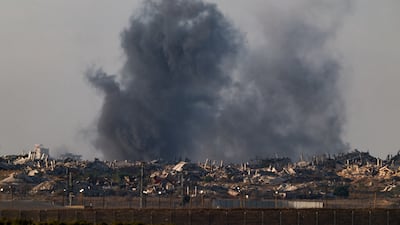The EU has said discussions on sanctioning Israel are on hold to support a fragile ceasefire in Gaza, but the bloc will keep the option to hand if the situation deteriorates again.
The EU's foreign affairs minister Kaja Kallas on Monday said that the bloc's 27 foreign affairs ministers had agreed that it was not a good time to move forward with a proposal to sanction extremist Israeli ministers and suspend preferential tariffs at an estimated yearly cost for Israel of €227 million ($265 million).
“We are not taking them off the table, but we are not moving with them either, because the situation is very fragile,” Ms Kallas said after a meeting in Luxembourg.
“The ceasefire has changed the context,” she said. “However, unless we see real and sustained change on the ground, including more aid reaching Gaza, the threat of sanctions remains on the table.”
EU officials had said ahead of the meeting that they wanted to keep the positive momentum going after US President Donald Trump announced a ceasefire on October 10.
Both the US and Israel on Monday said the ceasefire was still in force despite Israel launching strikes in response to attacks on its forces, killing at least 45 Gazans. Aid to Gaza has also resumed after Israel had announced a temporary suspension.
However, the border crossing at Rafah remains closed. This has delayed the anticipated relaunch of the EU's border mission, which had been initially announced for last week. The mission includes 34 European trainers from nine member states whose job is to prepare Palestinian border police.
Initially set up in 2005, it was shut down after Hamas's take over of the enclave two years later. It was operational again for a short period this year to allow a limited number of Gazans to leave for medical treatment.
Israel blocks aid
Hadja Lahbib, the EU's commissioner for humanitarian aid, was frustrated by how slowly aid was allowed back into Gaza. Speaking to The National on the sidelines of the meeting in Luxembourg, Ms Lahbib said it would be a “waste” if 170,000 tonnes of EU-funded aid waiting to enter was not allowed in.
“We must at some point move from words to making use of leverage,” Ms Lahbib said. “Otherwise, we will be condemned to being powerless and dependent on other actors, such as the United States.”
A “number of states” believed that there was “no room” for sanctions on Israel to be adopted, Czech Foreign Minister Jan Lipavsky, whose country is one of Israel's closest EU allies, said.
However, countries such as Spain and Ireland have insisted they should remain on the table.
“I believe that the sanctions must be maintained at this time. We have not yet achieved much with respect to the objectives we had set. There is the release of all the hostages. There is also the entry of humanitarian aid,” Spain's Foreign Minister Jose Manuel Albares said.
Ireland's Foreign Minister Simon Harris called for Europe to “keep all the options on the table”, while also playing a “constructive role in relations to peace”.
Discussing sanctions on Israel has been a difficult process among the EU's 27 states, which have been deeply divided for the past two years over how to address Israel's war on Gaza.

A few days after Mr Trump announced a ceasefire on October 10, European Commission chief spokeswoman Paula Pinho said the changed context may influence internal discussions on sanctions that had been tabled in September.
The EU hopes the Palestinian Authority will be able to strengthen its role and take over the governance of Gaza. Ms Kallas has said she wants a seat at the table of Mr Trump's so-called “Board of Peace” for the enclave.
The bloc will convene on November 20 for a donor conference for the Palestinian authority, the EU's commissioner for the Mediterranean, Dubravka Suica, said in Luxembourg.
Arab states are expected to be invited. Egypt is also hosting a humanitarian conference next month with the support of European countries.
Discussions on PA reforms will be on the table at the Brussels meeting, Ms Suica said. “The money which we give to the Palestinian Authority is also somehow prone to conditions,” Ms Suica added. The EU is the PA's leading donor.
The EU's pause on moving forward with sanctions on Israel has been criticised by rights organisations, which have pointed to an EU review in July that found that Israel had ignored its human rights obligations enshrined in a treaty that governs EU-Israel relations.
“Ceasefire or not, those egregious abuses persist and are incompatible with the agreement’s human rights clause,” Human Rights Watch said in a statement. “Rather than easing pressure now, the EU should act on its own findings, uphold international law and end the impunity that fuels Israel’s past and continuing crimes.”
Some EU countries have taken national measures against Israel due to failures to take decisions collectively. The Netherlands recently became the fifth EU state to say it would work on banning trade with the occupied Palestinian territories in application of a July 2024 advisory opinion of the International Court of Justice. Belgium, Ireland, Spain and Slovenia have made similar announcements.
It will take a “few months” for the Netherlands to move forward with the necessary legislation, Dutch Foreign Minister David van Weel said in Luxembourg. “We're still continuing on the preparatory path for that,” he said, responding to a question from The National.


